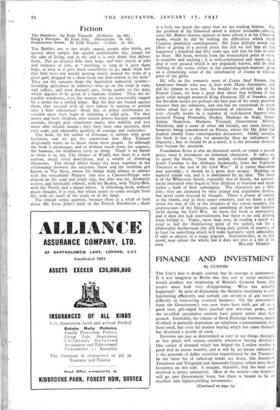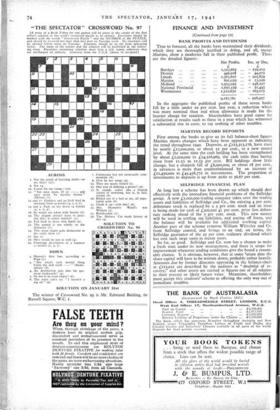FINANCE AND INVESTMENT
By CUSTOS
THE City's face is deeply scarred, but its courage is undauntea. If it was imagined in Berlin that this sort of aerial onslaught would produce any weakening of Britain's financial front, the results must look very disappointing. What has actually happened? In spite of dislocation, the financial machinery is still functioning efficiently, and nobody can complain of any serious difficulty in transacting essential business. On the investment front the Government's two new loans have both got off to a good start, gilt-edged have reached new war-time peaks, and the so-called speculative sections have gained rather than lost ground. Inevitably, the volume of Stock Exchange business, much of which is normally dependent on telephone communication, has been small, but even the modest buying which has come through has disclosed a dearth of stock.
Investors are just as determined as ever to see things through, so that prices will remain sensitive whenever buying develops. One source of demand which has helped the London market a good deal in recent months, and is still by no means exhausted, is the proceeds of dollar securities requisitioned by the Treasury. In the latest list of called-up stocks are many, like American Telephone and Telegraph and Anaconda Copper, which have been favourites on this side. I imagine, therefore, that the total sum involved is pretty substantial. Most of the money—one hopes— will go into Government loans, but there is bound to be an overflow into higher-yielding investments.
(Continued on page 74)
FINANCE AND INVESTMENT
(Continued from page 72) BANK PROFITS AND DIVIDENDS
True to forecast, all the banks have maintained their dividends, which they are thoroughly justified in &Sing, and all, except Martins, show a moderate fall in their published profit. These are the detailed figures: Barclays ...
District ...
Lloyds ...
Midland ...
National Provincial Westminster
•• •
••• • •• • ••
•• •
Net Profits. £
1,525,665
446,018 1,383,807 891,029
1,933,093
1,697,539 1,310,630
•••
• .• • • • • • .
• • • • • • • • •
-
Inc. or Dec.
- 259,215
- 44,072 - 205,839
+ 15,006 - 248,257 - 21,445 - 165,115
9,187,781
- 928,937 In the aggregate the published profits of these seven banks fell by a little under to per cent. last year, a reduction which was more nominal than real when allowance is made for the heavier charge for taxation. Shareholders have good cause for satisfaction at results such as these in a year which has witnessed a substantial rise in costs, to say nothing of other troubles.
MARTINS RECORD DEPOSITS
First among the banks to give us its full balance-sheet figures Martins shows changes which have been apparent as indicating the trend throughout 1940. Deposits, at £123,313,176, have risen by nearly £13,000,000, or about 12 per cent., to a new record _level. At the same time the cash holding has been strengthened by about £2,000,00o to £14,316,969, the cash ratio thus having risen from 11.23 to 11.55 per cent. Bill holdings show little change, but a sharpish fall of £8,000,00o, or about 18 per cent., in advances is more than counterbalanced by an increase of 411,450,000 to £45,458,772 in investments. The proportion of investments to deposits is up from 30.62 to 36.67 per cent.
SELFRIDGE FINANCIAL PLAN
At long last a scheme has been drawn up which should deal effectively with the immediate financial problems of the Selfridge group. A new £1,000,000 trading company takes over the trading assets and liabilities of Selfridge and Co., the existing 4 per cent. debenture stock is replaced by a 5 per cent. stock and an issue is being made for cash of £3oo,000 42 per cent. prior lien deben- ture ranking ahead of the 5 per cent. stock. This new money will be used in settling tax liabilities, and paying off loans, and the balance will be available for additional working capital. Another part of the scheme removes William Whiteley and Co. from Selfridge control, and brings to an end, on terms, the Selfridge guarantee of the 25 per cent. ordinary dividend which has cost such large sums in recent years.
So far, so good. Selfridge and Co. now has a chance to make a fresh start under its new management, and there is scope for improvement whenever trading conditions give the board a reason- able chance. It is obvious, however, that at some future date the share capital will have to be written down, probably rather heavily. Amounts due by former directors appearing in the balance-sheet at £115,031 are described by the 'auditors as " doubtful of re- covery," and other assets are carried at figures out of all relation to their present or likely future value. Meantime, shareholders must, accept this creditors' scheme as offering the only way out of immediate troubles.































 Previous page
Previous page